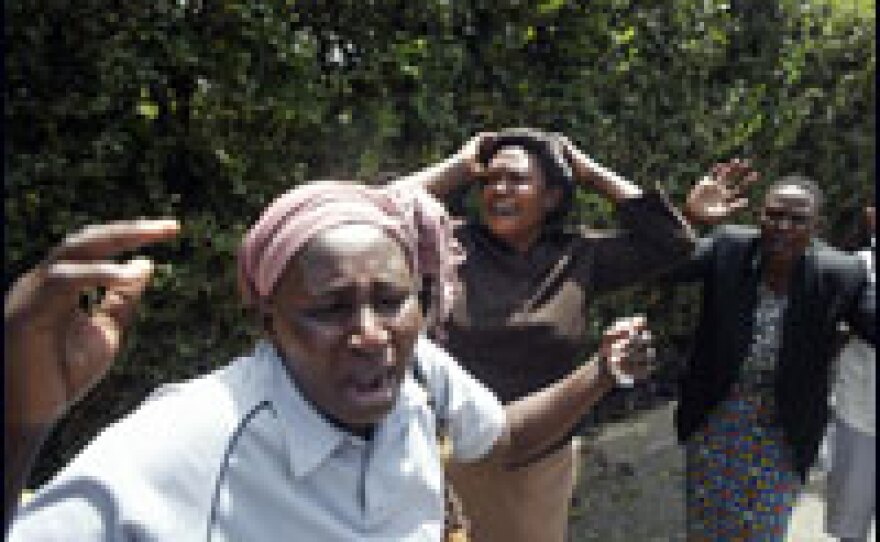
The killing of an opposition politician added new fuel to the violence in Kenya on Tuesday as former United Nations chief Kofi Annan renewed efforts to mediate an end to the monthlong crisis.
Government helicopters fired on mobs rioting in the Rift Valley, and clashes broke out in and around the capital city, Nairobi, reportedly killing at least a dozen people.
Formal mediation talks began hours after newly elected opposition legislator Melitus Mugabe Were was killed. Were was the first political leader slain in the violence that has claimed more than 800 lives following last month's disputed presidential election.
Gunmen pulled up behind his car — right outside the gate of Were's house — dragged him out and shot him dead. It was not clear whether the killing was politically motivated or criminal, but the opposition described it as an assassination.
Crowds of sympathizers gathered at the lawmaker's house in a bourgeois Nairobi suburb. Their tears were mixed with shock and anger.
Police fired tear gas into the compound to disperse mourners and supporters, some of whom were taunting officers.
Gunfire could be heard in the nearby Kibera slum, an opposition stronghold and notorious flashpoint. More bloody protests also broke out in Kenya's Rift Valley. An hour's drive from Nairobi, military helicopters firing rubber bullets dive-bombed mobs wielding machetes and clubs at refugees of a different tribe trying to flee the violence.
Meanwhile Tuesday, Annan, the former U.N. secretary-general, launched formal mediation efforts to end the post-election crisis. He appealed to Kenya's political leaders to restore law and order.
"To the leaders gathered here today, I say this: The people need you, they want you to take charge of the situation and do whatever possible to halt the downward spiral into chaos that is threatening this beautiful and prosperous country," he said. "You have to act with urgency."
The disputed re-election of Kenya's president, Mwai Kibaki, last month unleashed a wave of unrest that has ballooned into a conflict pitting rival ethnic groups supporting one or another politician against each other. Opposition leader Raila Odinga says the presidential vote was rigged and he was robbed of victory.
On Tuesday, both men condemned the violence and committed themselves to finding a solution.
"The national fabric has been broken," Odinga said. "The very foundation of the state is crumbling. Violence is spiraling out of control. ... Unless we ourselves here resolve to act quickly to save our nation, there might be no nation left to save."
Kibaki echoed his concern about the bloodshed. "It is unfortunate that, in some parts of the country, neighbors who have lived side by side peacefully for many years have been incited to hate one another and view each other as enemies... I feel deeply saddened to see Kenyans confronting one another violently," he said.
Annan expressed confidence that the immediate political issues in Kenya could be resolved within a month — or sooner — and that the broader problems underlying the crisis would be resolved within a year. Kibaki and Odinga's teams began negotiations immediately.
Hopeful Kenyans — many of whom blame the politicians for the crisis — are desperate for peace.
Copyright 2022 NPR. To see more, visit https://www.npr.org. 9(MDAzMjM2NDYzMDEyMzc1Njk5NjAxNzY3OQ001))







